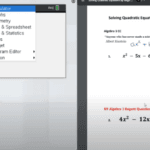The Importance of a Science Club in Student Learning
The establishment of a science club within a high school framework plays a crucial role in enriching the educational experience for students. It acts as a catalyst for fostering a deeper interest in scientific disciplines, providing students with an environment where critical thinking and creativity can flourish. By engaging in various activities that transcend the standard curriculum, students are given opportunities to explore complex scientific concepts in a more approachable manner.
Participation in a science club encourages hands-on learning, which is instrumental in solidifying theoretical knowledge. When students engage in experiments or conduct projects in preparation for science fairs and competitions, they can apply what they learn in the classroom to real-world scenarios. This practical application not only enhances comprehension but also nurtures a passion for science that can last a lifetime. Furthermore, students learn to work collaboratively, developing important soft skills such as communication, teamwork, and problem-solving.
Moreover, science clubs often pave the way for students to participate in regional and national science competitions. These experiences serve to motivate students and challenge them to reach new heights in their scientific endeavors. Success stories abound, showcasing students who have blossomed through their involvement in science clubs, leading to remarkable achievements in academic and research-based pursuits. Such extracurricular initiatives cultivate a sense of belonging and pride among members while reinforcing the importance of scientific inquiry and innovation.
In conclusion, a science club is an invaluable asset to the high school curriculum, enhancing students’ learning experiences. Through fostering critical thinking, creativity, collaboration, and hands-on learning, it prepares students not only for academic success but also for future endeavors in the vast field of science.
If you click the links below and make a purchase, we earn a commission at no additional cost to you.
Strategies to Encourage Student Sign-Up and Participation
Recruiting students to join the science club and ensuring their engagement throughout the school year is vital for a successful program. One effective strategy is to organize informative meetings at the beginning of the academic year. These gatherings can provide an overview of the club’s mission, its planned activities, and the benefits of participating in science fairs and competitions. By highlighting past achievements, such as awards won at science competitions, teachers can create excitement and motivation surrounding the club.
Utilizing social media for outreach is another modern approach to attracting students. Creating an active presence on platforms popular with high school students can facilitate engagement and showcase the club’s activities. Regular updates about upcoming events, science fairs, and interesting scientific discoveries can generate buzz and encourage membership inquiries. These platforms allow for interactive communication, enabling students to ask questions and express their interests, fostering a sense of community, even before joining.
Promotional materials play a crucial role as well. Flyers, posters, and digital graphics that detail the club’s purpose and upcoming events should be visually appealing and easy to read. Including details about major activities like science competitions and collaborative projects can pique interest. Furthermore, consider hosting hands-on science demonstrations during school events or assemblies. Such experiences can directly showcase the enjoyment that comes from participating in the science club.
Creating an inclusive environment is equally crucial for sustained participation. It is important to ensure that all students feel welcome, regardless of their prior knowledge or experiences in science. Establishing mentorship opportunities where experienced members guide newcomers can help bridge this gap, and fostering collaboration on projects can strengthen peer relationships. Ultimately, these strategies will cultivate an engaging atmosphere, encouraging students to sign up and be actively involved in the science club.
If you click the links below and make a purchase, we earn a commission at no additional cost to you.
Content Ideas and Project Planning for the Science Club
Developing engaging projects and themes for a high school science club is essential for fostering enthusiasm and curiosity among students. A successful science club can encompass a variety of activities that appeal to different interests and science disciplines. Teachers can initiate hands-on experiments that allow students to explore scientific concepts practically. For instance, conducting experiments on chemical reactions using everyday materials can provide an engaging understanding of fundamental chemistry principles.
Another dynamic approach is encouraging research projects in which students investigate topics of personal interest within the scientific realm. This could include exploring environmental issues, such as the impact of climate change on local ecosystems, or investigating renewable energy sources like solar and wind energy. By allowing students to choose their topics, teachers can ensure that the projects align with their interests, thus enhancing motivation and investment in the outcomes.
Additionally, planning demonstration activities can be an impactful way to cultivate engagement in the science club. Organizing a science fair where students exhibit their projects and experiments not only promotes collaboration but also provides an excellent platform for them to practice communication skills. Moreover, students can participate in science competitions, which often motivate them to excel and further develop their scientific reasoning and problem-solving skills.
When structuring these projects, it is crucial for educators to incorporate opportunities for teamwork, as collaboration often leads to a deeper understanding of the subject matter. Setting clear objectives and providing ample resources for students to succeed will make the experience enriching. By thoughtfully implementing these ideas, teachers can create an engaging science club that sparks student curiosity and nurtures their scientific acumen, systematically preparing them for future academic pursuits.
Preparing Students for Competitions: A Step-by-Step Guide
Participating in science competitions such as the Science Olympiad, Science fairs, ISEF, and the Genius Olympiad can be a transformative experience for students in a science club. These events not only foster critical thinking and teamwork but also enhance students’ understanding of scientific principles. To prepare students effectively, teachers should follow a structured approach that includes selecting the right competition, understanding requirements, and developing a tailored timeline.
First, it is crucial to evaluate the different competitions available and assess which aligns best with the interests and skills of your science club members. Each competition has unique focuses, from hands-on projects to theoretical presentations. By engaging students in discussions about their preferences, teachers can help identify competitions that resonate with their passions while ensuring that members are enthusiastic and invested.
Next, understanding the specific requirements and judging criteria is foundational. Teachers should provide students with resources, such as the competition guidelines and scoring rubrics, to familiarize them with what judges will be looking for. A thorough understanding of these expectations can guide students in selecting appropriate projects, ensuring that their work meets the standards outlined by the competition’s organizers.
Developing an effective timeline for preparation is equally important. Teachers should work with students to create a schedule that includes project milestones, practice presentations, and opportunities for feedback. Incorporating regular check-ins helps maintain engagement and allows for adjustments as needed. Students should also focus on refining their presentation skills, which play a significant role in their overall performance during competitions.
Finally, offering mentorship throughout the preparation process can greatly enhance students’ confidence and capabilities. Teachers should encourage open dialogue, provide constructive feedback, and foster an environment that promotes learning and curiosity. By following these steps, science clubs can successfully prepare their members for science competitions, paving the way for rewarding and enlightening experiences.











